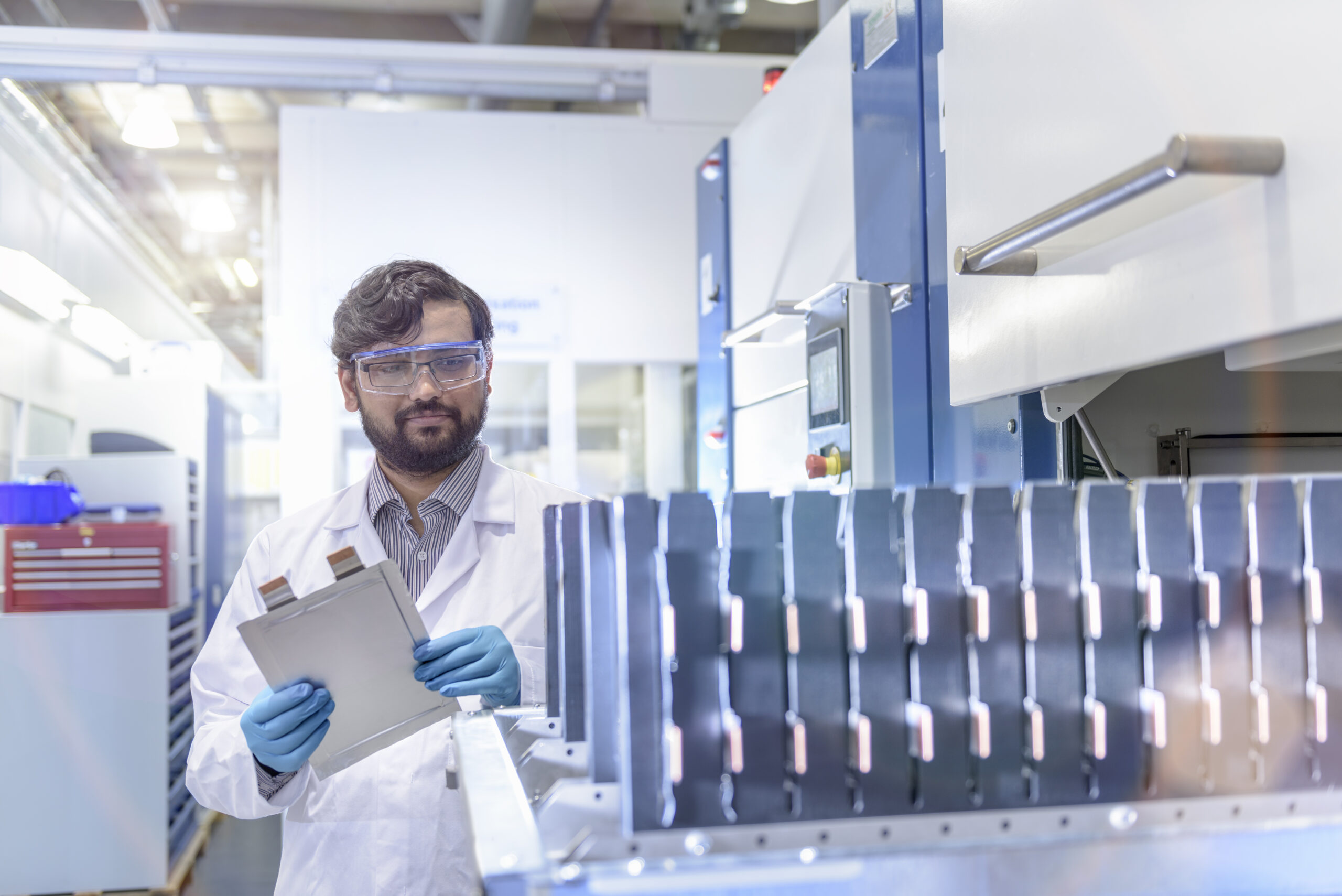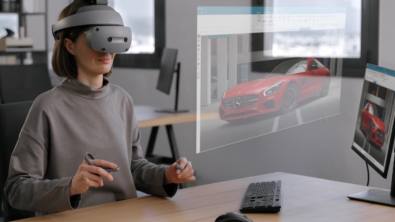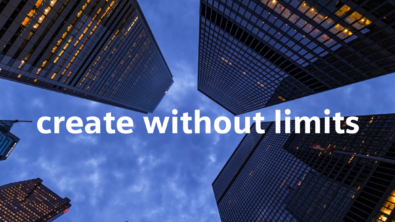The future of batteries in Europe – The Battery Podcast S01E10 – Transcript

Here is the transcript for another great episode of the Battery Podcast (S01E10), with Marc Deyda of Siemens Digital Industries and Taavi Madiberk of Skeleton Technologies discussing the future European battery market. Enjoy!
Nick Finberg
Welcome to the Battery Podcast from Siemens Digital Industries! We are here again to talk with industry experts in the battery world to bring you an update on what is happening globally and how companies are making a future for their business. Today’s guest is Taavi Madiberk, the CEO and Co-Founder at Skeleton Technologies, with our host Marc Deyda. Take it away Marc!
Marc Deyda
Hey, Taavi. Happy to have you here in Nürnberg We today do a podcast for our listener of the battery business. And I don’t know, do you remember what we have together, what nobody else knows?
Taavi Madiberk
Actually, I do remember.
Marc Deyda
What is it?
Taavi Madiberk
So we have both had our good firm handshake with president Macron.
Marc Deyda
Definitely, it was a couple of years ago, but I think what was the reason for you to have that handshake with Mr. Macron?
Taavi Madiberk
So we are constantly looking at further expansion in terms of building new factories, expanding our market. And I will be again visiting president Macron this year in May.
Marc Deyda
It was a wonderful recording, right? So in general, when France and Germany, if you compare these both countries, so usually in Germany there are a lot of talks ongoing not to build up plants in Germany. What is the reason for that and why did you choose to build up a plant in Germany?
Taavi Madiberk
Yes, good question. You know, we started 15 years ago in Estonia, in Eastern Europe. People ask me that, “Taavi, have you gone mad that you are coming from Eastern Europe and going to manufacturing in Germany?” But there is good reasons behind it. If we look at the supercapacitors, when from the manufacturing cost, the labor cost is actually only 5 to 6%. Meaning that whether you manufacture the supercapacitors in Vietnam, in France or Germany, it does not matter that much. What matters is actually the quality of the product, the scale and automation. Secondly, in terms of Germany, we looked at the ecosystem. And in terms of ecosystem, one part is having key customers in Germany, but also we have wide corporations with local Fraunhofer. And then of course one thing that ties up the ecosystem is companies like Siemens, who can not be only customers and development partners, but who can provide very practical support in scaling up the manufacturing and the overall business.
Marc Deyda
You mentioned fortunately Siemens, so thank you for that. But how would you describe the collaboration experience so far? So considering the dynamic between a fast-paced startup such as you are, Skeleton and a slower-paced industry giant like Siemens.
Taavi Madiberk
Yes, I would firstly look at the big picture and if we look at the example of Elon Musk and Tesla. When many people think that Tesla was here an exception and built a real hardware business by doing it themselves. But even Tesla had early on partners like Daimler, Toyota in order to make it happen. And if you look at the partnership with Siemens, I think the key part is that the Siemens who we know, they are working on the weekends. We pick up the calls whenever is needed. And if we put these two things combined, a startup and a large industrial, then what are the benefits? Firstly, Siemens in many business units with rail, with port grains, with grid stability is already our customer. So that’s one big benefit. The second topic for us is that Siemens can really bring in the network and expertise, how to build up the business and have the necessary links with the customers. But thirdly, in terms of, let’s be honest, the hardware business, what’s the key about hardware? Hardware is hard. Scaling up hardware and in order to be competitive with China, US and other regions, you need to have the quality, you need to have the automation level and you need to make sure that your costs are on par. And here is where we really see the value from Siemens side. So it’s one part of the ecosystem and I think that unlike the internet, in cleantech we will not see a single winner. Or like if you look at search engines, when there are not so many search engines, we have Google. But in cleantech, the key is cooperating with different partners because I would say that the market opportunity for cleantech, it is the biggest business opportunity since the internet and Europe can only win by working together.
Marc Deyda
Yeah, thank you, Taavi. So in terms of technology, battery technology, could you elaborate on how Skeleton focus on high power applications and stability combined with the use of graphic material sets you apart in the battery industry, especially in comparison to traditional kilowatt hours focus models?
Taavi Madiberk
Yes. So you know, back in 2009 when we started from a 40 square meter lab, when we understood early on that we don’t have a lot of money or resources and if we want to be successful in the market, we really need to differentiate. So the question is, how do we do it? Our first topic is that with supercapacitors. This is a product where the devices can be charged only in a matter of seconds and you have 1 million charge discharge cycles in total. So you have a very long lifetime. And if you look at also the raw materials aspect, when we don’t need any lithium, cobalt or manganese, but we can have a fully European value chain. But now for practical use cases, we always say that we are in the megawatt second business, not in the kilowatt hour business. So we are the last line of defense when it comes to grid stability and virtual inertia. In terms of electric vehicles, we are not well suited to be the main battery, but we are the key in terms of ensuring the reliability of electric vehicles on the low voltage side. And if you think about all hard to decarbonize sectors, mining trucks, port grains, heavy industry, when what do these industries require? We don’t require tens of hours of driving. We require high power, extreme reliability and a low total cost of ownership. And this is really where Skeleton comes into play. And if you compare with competition, we also understood that if you want to be competitive against players from Asia, what is the key? The key is that you have to have a differentiator on the materials level. And that’s why we developed our own curved graphene material, what we are currently scaling up in Bitterfeld-Wolfen. And the question is not only in terms of performance and having more energy, but the real question is lowering the cost for the customer. Because if you really want to fight climate change, then the key is not having great technology. The key is lowering the cost for the customers who save the CO2 emissions.
Marc Deyda
That’s interesting. You mentioned a lot of times competitive. So in terms of competitive, you choose a lot of machine builders from Asia. What makes them more different from others like Western ones? And what is your expectation clearly to the machine builders to supply your battery production plant?
Taavi Madiberk
We have actually a mix of Asian and European companies. And of course the market is global, meaning that in each step of the manufacturing process we need to have equipment which is competitive. And I think it’s very clear that Asia is five to ten years ahead in Europe in the battery market. But the only way we can catch up is really to focus on the automation, focus on self-learning algorithms and AI, and to lean on the experience of large corporates. But the point of, if I look at the Skeleton success as well, the key point is to do the scale-up right. And for that, the cooperation with Siemens is actually one of the critical issues because of course as a growing company we cannot have all the competences internally. But if we partner with others who have already done it, then we can be competitive on the global scale. So for the machine builders in Europe, I would say that scale here is the key, but the industry needs to go together in a way that we can compete with both US and Asia.
Marc Deyda
That’s quite interesting. So let’s have a deeper look at the technology approach. So you mentioned already AI, but for example how IoT and virtual commissioning technologies have been already applied in your plant. So what was the biggest benefit out of this?
Taavi Madiberk
Firstly, I would stop on the AI topic, but it’s a nice fancy keyword. But we need to look at what is actually behind it. And the key in terms of learning from the process and noticing the correlations which maybe the human eye cannot notice is reducing the bill of materials and having better quality. And here we see already in the cooperation what we have done is that for our electrode manufacturing we have had practical impacts on both the yield and output by utilizing this. In terms of IoT and virtual commissioning, let’s say there’s one truth about every battery gigafactory, which maybe is not usually told in regular podcasts, but the truth is that s*** hits the fan every time around in terms of battery scale up. And now the topic is that if you know that this is already happening, what do you do about it? And virtual commissioning is a very practical thing in terms of looking at all of the risks and all of the topics where s*** can hit the fan and solving them up in advance. Because if you do it later on, then the pain is immense and that pain of course comes at the direct cost. And if you talk about IoT, then the key topic is again it’s a keyword, but what is the practicality of that? To have proper manufacturing flow to reduce the cost, to be more efficient about it. Again, I think here in Europe we really need to think about not creating a European battery industry only. Because let’s be honest, we will not be competitive if we say that we also make batteries in Germany or we also make supercapacitors in France. That’s not enough. We need to have a differentiator and that’s why virtual commissioning, IoT and the entire approach to the IT infrastructure is critical. And that will not be achieved by a single company in-house. That actually requires block-back cooperation with the companies who have the domain expertise. And this is what we have done in Skeleton.
Marc Deyda
So it was quite funny that you mentioned s*** makes s***, right? So let’s take the opposite. So you always use the word super. Supercapacitor, super working mode with Siemens, thanks to that. And you announced the super battery manufacturing. What will change with this future product? Are you going to be now also battery manufacturer?
Taavi Madiberk
Yeah. So in terms of Skeleton, our strategy is to satisfy the high power requirements with the lowest cost and lowest CO2 emissions. So the super battery in essence is a combination of the high power of the supercapacitors and high energy of lithium ion batteries. So if you look at supercapacitors, we are very well suited for applications where the burst of energy or peak power or charging time is less than one minute. With the super battery, we are targeting applications which go up to 45 minutes. And this is now the benefit for the customer. You have 50,000 cycles, meaning that if you look at regular batteries, you would have maybe 3,000 to 5,000 charged discharge cycles. And why this is important? Because in the end of the day, to fight climate change, we need to have a lower total cost of ownership. Furthermore, with the super battery, we can really address this hard to decarbonize sectors. But when it comes to utility vehicles, when it comes to mining, today the technical solutions are not yet there to go to zero emissions. And this is what the super battery does. So in Skeleton, we always say that we go after the CO2 emissions, which otherwise would not be saved. And that’s why we brought the super battery into action.
Marc Deyda
So that’s in the direction of sustainability already, right? So what do you expect from a supplier, from Siemens, to be sustainable? So what is your clear expectation? What do we have to supply or have to develop still solutions for?
Taavi Madiberk
In terms of sustainability, I would address here two aspects. The first topic of course relates to the manufacturing footprint. If you look at the general battery industry, we need to have an honest discussion about how much CO2 emissions are created in the manufacturing process. And this goes to not only the battery raw materials, but this actually goes to the component machine suppliers as well. Because otherwise we don’t achieve our overall climate objectives. I think the second part of sustainability which in Europe is under-addressed is that the players in the battery value chain need to be in Europe sustainable themselves. So we have a very close eye actually in terms of scale up on the profitability of the business. And this is, I would say this way, that if European battery companies do not differentiate and they are not profitable long term, then the fight against climate change will not be won. I think that from the policy perspective for European policy makers we need to have a close and hard look at what is the competitive landscape, especially against the US and China and the eastern ecosystem actually fully supporting that. So in sustainability let’s talk about two topics, the classics in terms of what does the value chain look like. But the second part is that the companies need to be sustainable themselves and in terms of value chains. We cannot rely on cobalt which we know 60% of the cobalt comes from Democratic Republic of Congo which might not be as democratic as the name first suggests. We need to really work on having the European battery raw material value chain.
Marc Deyda
The whole life cycle of the battery, so that means battery passport in that direction?
Taavi Madiberk
Exactly. But we need to look at the whole life cycle. We need to look at also in terms of what it means for the European economy. Because let’s be clear that if you look at top 20 technology companies, when we have maybe one or two European players and the battery industry is actually the natural domain where Europe should be strong. But this market today is dominated by Asian players and I think it’s not only a question in terms of climate change which is of course a critical topic. But we need to look at the bigger picture that industries being built in Europe would have long term value. Because otherwise Europe faces a topic that might be the best technology museum in 20 years time if we don’t take the action now.
Marc Deyda
We will be side to the sustainability, IoT, virtual commissioning technologies. So what are the key takeaways about what Siemens is offering for start-ups and growth companies? Are you in your mind? So what are Siemens additionally serving and supplying?
Taavi Madiberk
Yes. So I think that we can separate into three main pockets. Firstly, if you look at climate change and climate technologies, Siemens is very well positioned starting from great stability to rail, to mining equipment, to marine and with the cooperation as a customer. And that of course is always key for companies going to scale up to have these off-take customers. Second part is all of the support when it comes to scale up. But there’s the hardware part that if you look at the modern battery factory, when let’s be honest, this is most cases running on Siemens PLCs.
Marc Deyda
Which is good, right?
Taavi Madiberk
Which is good because we need more standardization. In the battery industry we do need more standardization. But the topic there is that this practical support in terms of scale up. But if you look at our Leipzig plant build-out, when we started with Siemens early on in terms of having the proper factory layout, having the logistics concept, getting the experts on board in order to have the proper requirements in place with the suppliers. But there’s the third element as well, and this is the ecosystem element.
Marc Deyda
So you see us as an interface between these end customers and machine builders, right?
Taavi Madiberk
Indeed. Nowadays it’s such that if you don’t have the right software, you can’t have a proper hardware product. And this is the same logic with machine builders. But if you look at machines as just standalone pieces of equipment, then you will never get to efficiency. You need to have something which ties it up. So Siemens with the IoT, with the PLM solutions and so on is one of the keys to have an efficiently running gigafactory. Because otherwise you basically have all the pieces of the puzzle, but you do not have the full big share which would work efficiently. But I would add the third topic here as well, that Siemens is also for Skeleton investors. So Siemens financial services has invested in Skeleton. And this is again, what is the importance of this? The importance of this is the following, that shows that the partner has the faith as a customer, as a scale-up partner. And this always allows to bring in additional investments, additional high quality investors to make sure that the shareholder interests are aligned for the long term. And for building a company which is really scalable, not only in Europe, but really on the global market.
Marc Deyda
So that means since a couple of years we work already closely together, so we start executing the project. So there are a lot of projects which you announced already. So what is your long term plan for joining the endeavor with Siemens? So is there something that you have in your mind? And can you give us a view in the future?
Taavi Madiberk
Yes, so we are just in the process of finalizing the first factor in Leipzig. But if you look at the customer demand, then it’s clear that we need to significantly expand our manufacturing footprint. So we started with the handshake with President Macron, but also meeting many other countries, but we are seriously looking into further expansion steps because it’s clear that if we want to have an impact, then that can only be done at scale. And if I look at Siemens, Siemens has the capability to scale together with us. And that is highly important. And we talk about the long term cooperation when, if you look at European competitive advantage, then what is Europe strong at? Europe is strong at in terms of different type of high power grid technologies. We have ABB, we have Siemens, we have other players. Heavy duty equipment when it comes to machinery, whether it’s mining equipment, whether it’s other type of construction equipment. And I think the next wave of growth in the European battery industry will come from the industrial front because these are really the hard to decarbonize sectors. And yes, we need to have our passenger vehicle battery industry, but we need to really look at how we differentiate. And we are bringing the capabilities of Siemens and Skeleton together can really make an impact and impact with a specific competitive advantage.
Marc Deyda
So great, Taavi. So as really always, it’s inspiring me and hopefully also the listener talking to you, right? So many insights you gave to us. I’m really happy with this podcast, hopefully the listener as well. I wish you good luck in all your upcoming activities. So we supply and support you as much as we can. And thanks for having you here, being my guests in the podcast. And right now, back to Nick.
Nick Finberg
Thank you so much Marc and Taavi, that gives me a lot to think about for the world of battery in Europe. And I hope the same can be said for the audience. If you are still looking to learn more about the battery industry, maybe check out some of our previous episodes. Or, if you want to find something more, our website siemens.com/battery is a great resource on your digitalization journey. And make sure to subscribe so you don’t miss out on future episodes.


